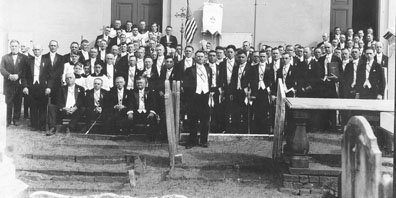
 CHARLESTON—The year was 1911. It was when the cancer virus was discovered, and the Mona Lisa was stolen. William Taft was president, and Catholic apologist G.K. Chesterton penned the bestseller “The Innocence of Father Brown.”
CHARLESTON—The year was 1911. It was when the cancer virus was discovered, and the Mona Lisa was stolen. William Taft was president, and Catholic apologist G.K. Chesterton penned the bestseller “The Innocence of Father Brown.”
It was also the year that the Knights of Columbus Assembly 1071 was formed in Charleston, and named in honor of Bishop Patrick N. Lynch, the third bishop of the diocese.
At that time, the Knights had only been in existence about 30 years and were still a relatively small group. The local district then encompassed North Carolina, South Carolina, Georgia and Florida.
Jim Anderson, a former faithful navigator and unofficial historian of Assembly 1071, said they were the first one in the Carolinas.
Today, the assembly still follows many of the traditions established by their forefathers 100 years ago, such as honoring the men and women who serve our country.
Recently, the Knights hosted a dinner at St. Thomas the Apostle Church in North Charleston to celebrate their 100th  anniversary.
anniversary.
Bishop Robert E. Guglielmone was the guest of honor and delivered the invocation. The bishop has encouraged men to join the Knights and participate in their call to live their faith through charitable works, caring for their families and defending the faith.
Anderson said almost all the bishops of Charleston have been fourth degree Knights, including Bishop Henry P. Northrop, who was a charter member.
The group was represented at the fete by two Knights who span the assembly’s history. Walter Duane, the oldest living faithful navigator (1958-59) and a past state deputy, and Bob Poyer, the current leader, performed the symbolic cutting of the cakes, each decorated with an American flag.
The Knights are organized into councils and members move through the ranks of the first three degrees, which are charity, unity and fraternity.
Fourth degree Knights are still part of the council, but also become members of an assembly, which is the visual arm of the Knights, Poyer said.
Known as the patriotic degree, these men are the ones who wear the regalia and serve at public events such as ordinations, parades and funerals.
“We come out whenever anybody asks us to,” Poyer said.
Most recently, Knights from Assembly 1071 served at the priestly ordination of Father Filip P. Wodecki.
Poyer said being at ordinations is among the most important of their duties. Assembly members also host an annual luncheon honoring police and firefighters, participate in the Holocaust Remembrance Day march, and serve as honor guard.
